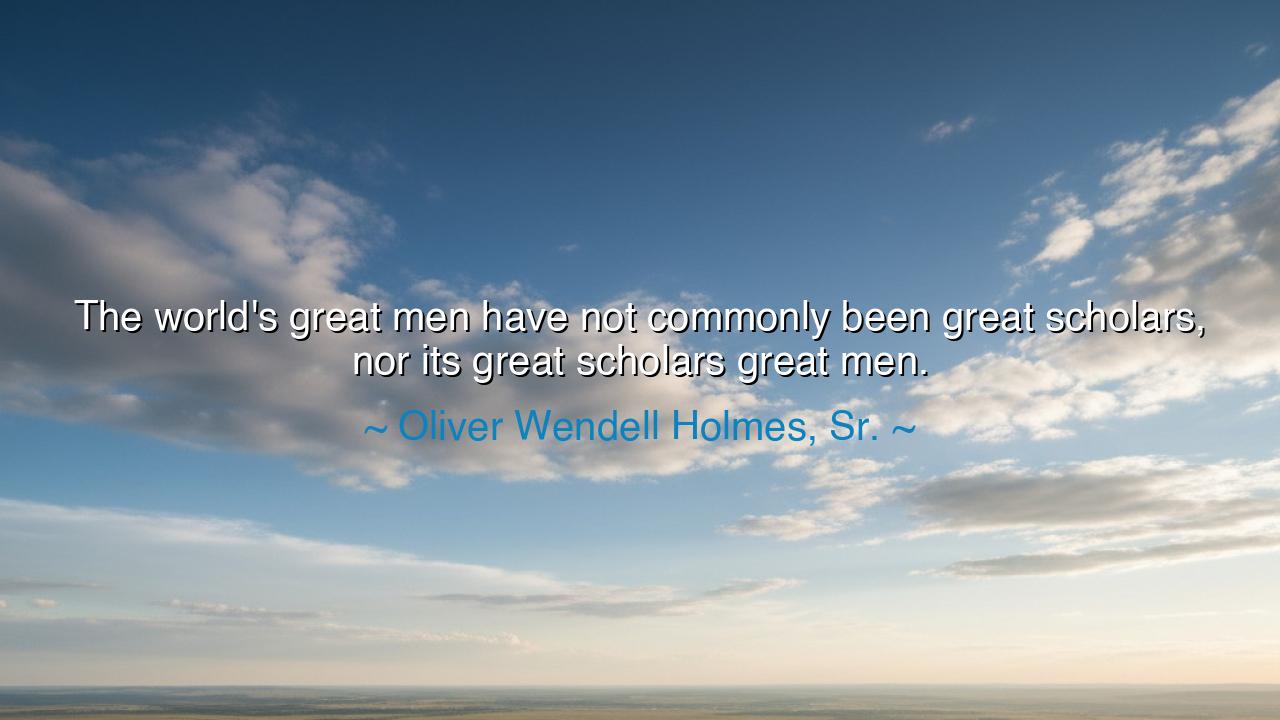
The world's great men have not commonly been great scholars, nor
The world's great men have not commonly been great scholars, nor its great scholars great men.






Hearken, children of the ages yet to come, and contemplate the profound words of Oliver Wendell Holmes, Sr., who declared: “The world's great men have not commonly been great scholars, nor its great scholars great men.” Within these words lies a meditation on wisdom, character, and the balance between knowledge and virtue, teaching that true greatness is not measured solely by learning or intellect, but by courage, action, and the strength of the soul.
Holmes’ reflection reminds us that scholarship alone does not confer greatness. The ancients understood this principle well: Socrates himself, revered as the wisest of men, claimed that true wisdom is the recognition of one’s ignorance. Knowledge, untethered to virtue or moral courage, may produce cleverness, yet without the fortitude to act rightly, it lacks the substance of greatness. Great men inspire, lead, and transform, not merely accumulate knowledge.
Consider the life of Alexander the Great, who was tutored by Aristotle yet achieved renown not through study alone, but through deeds of courage, strategy, and audacity. His scholarship informed his vision, but it was his actions, his leadership, and his relentless pursuit of ambition that etched his name into history. Holmes’ truth shines here: intellectual mastery without character may illuminate the mind, but heroic action illuminates the world.
Conversely, Holmes warns that great scholars may lack the qualities that elevate men to enduring greatness. Knowledge, when divorced from application, courage, or moral purpose, may enrich the mind but not the human spirit. The Roman scholar Seneca possessed vast understanding of virtue and philosophy, yet it was the lives of those who enacted these principles—heroes, leaders, and sages—that left the deepest mark on history. Scholarship informs, but character and action define legacy.
This reflection also underscores the importance of balance. True greatness emerges when intellect is coupled with moral courage, empathy, and vision. The ancients revered leaders who combined knowledge with action, strategy with integrity, and foresight with compassion. To be a scholar is noble, to be a man of virtue is noble, yet the highest honor arises when the two converge, guiding thought into deeds that shape the world.
From this meditation emerges a timeless lesson: pursue learning, but let it serve wisdom and action; cultivate intellect, but temper it with virtue, courage, and humility. Holmes teaches that greatness is measured not by the accumulation of knowledge alone, but by the character and deeds that bring it to life, and that a life of impact arises from the unity of thought and action.
Practical guidance flows naturally: study diligently, seek knowledge broadly, but test it in the crucible of experience. Engage in acts that cultivate courage, integrity, and empathy. Observe those who inspire the world, not only through intellect but through their deeds, and let your learning guide action rather than dictate it. Knowledge without purpose is a flame without light; action without wisdom is a sword without direction.
Children of the ages, let Oliver Wendell Holmes’ teaching illuminate your hearts: greatness is not merely the product of learning, nor the pursuit of scholarship alone. Be wise in thought, steadfast in virtue, and courageous in action. In this union, the mind and soul ascend together, and your life may shine as a beacon of true greatness, inspiring generations yet unborn.
If you wish, I can also craft a more narrative, epic version, illustrating scholars and great men side by side, showing the contrast and union of intellect and action in a vivid oral storytelling style. Do you want me to do that?






AAdministratorAdministrator
Welcome, honored guests. Please leave a comment, we will respond soon